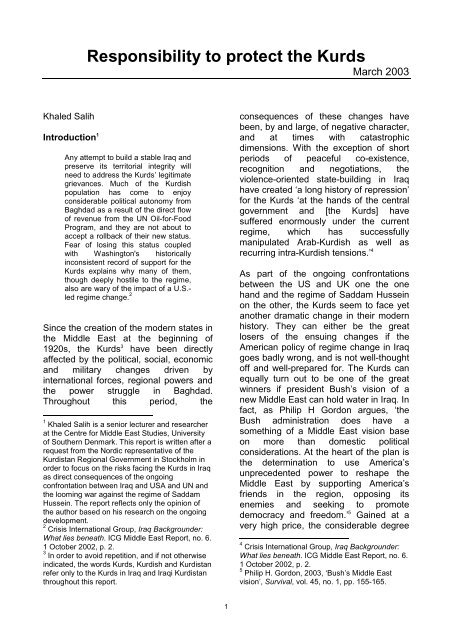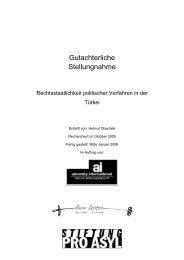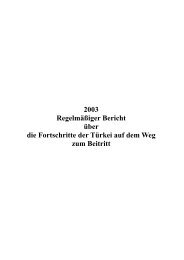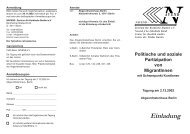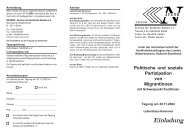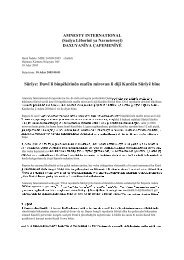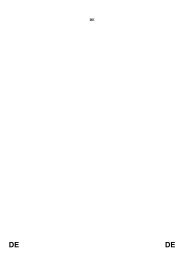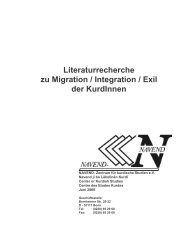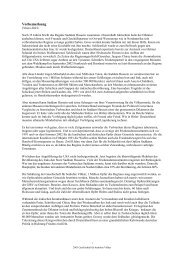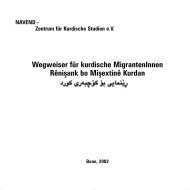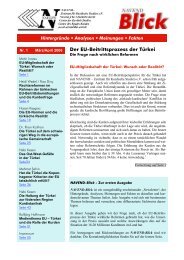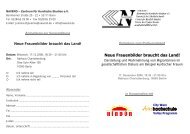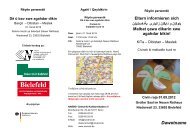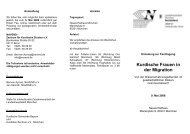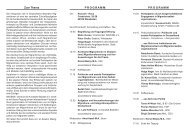Responsibility to protect the Kurds - Navend
Responsibility to protect the Kurds - Navend
Responsibility to protect the Kurds - Navend
You also want an ePaper? Increase the reach of your titles
YUMPU automatically turns print PDFs into web optimized ePapers that Google loves.
Khaled Salih<br />
Introduction 1<br />
<strong>Responsibility</strong> <strong>to</strong> <strong>protect</strong> <strong>the</strong> <strong>Kurds</strong><br />
March 2003<br />
Any attempt <strong>to</strong> build a stable Iraq and<br />
preserve its terri<strong>to</strong>rial integrity will<br />
need <strong>to</strong> address <strong>the</strong> <strong>Kurds</strong>’ legitimate<br />
grievances. Much of <strong>the</strong> Kurdish<br />
population has come <strong>to</strong> enjoy<br />
considerable political au<strong>to</strong>nomy from<br />
Baghdad as a result of <strong>the</strong> direct flow<br />
of revenue from <strong>the</strong> UN Oil-for-Food<br />
Program, and <strong>the</strong>y are not about <strong>to</strong><br />
accept a rollback of <strong>the</strong>ir new status.<br />
Fear of losing this status coupled<br />
with Washing<strong>to</strong>n's his<strong>to</strong>rically<br />
inconsistent record of support for <strong>the</strong><br />
<strong>Kurds</strong> explains why many of <strong>the</strong>m,<br />
though deeply hostile <strong>to</strong> <strong>the</strong> regime,<br />
also are wary of <strong>the</strong> impact of a U.S.led<br />
regime change. 2<br />
Since <strong>the</strong> creation of <strong>the</strong> modern states in<br />
<strong>the</strong> Middle East at <strong>the</strong> beginning of<br />
1920s, <strong>the</strong> <strong>Kurds</strong> 3 have been directly<br />
affected by <strong>the</strong> political, social, economic<br />
and military changes driven by<br />
international forces, regional powers and<br />
<strong>the</strong> power struggle in Baghdad.<br />
Throughout this period, <strong>the</strong><br />
1 Khaled Salih is a senior lecturer and researcher<br />
at <strong>the</strong> Centre for Middle East Studies, University<br />
of Sou<strong>the</strong>rn Denmark. This report is written after a<br />
request from <strong>the</strong> Nordic representative of <strong>the</strong><br />
Kurdistan Regional Government in S<strong>to</strong>ckholm in<br />
order <strong>to</strong> focus on <strong>the</strong> risks facing <strong>the</strong> <strong>Kurds</strong> in Iraq<br />
as direct consequences of <strong>the</strong> ongoing<br />
confrontation between Iraq and USA and UN and<br />
<strong>the</strong> looming war against <strong>the</strong> regime of Saddam<br />
Hussein. The report reflects only <strong>the</strong> opinion of<br />
<strong>the</strong> author based on his research on <strong>the</strong> ongoing<br />
development.<br />
2 Crisis International Group, Iraq Backgrounder:<br />
What lies beneath. ICG Middle East Report, no. 6.<br />
1 Oc<strong>to</strong>ber 2002, p. 2.<br />
3 In order <strong>to</strong> avoid repetition, and if not o<strong>the</strong>rwise<br />
indicated, <strong>the</strong> words <strong>Kurds</strong>, Kurdish and Kurdistan<br />
refer only <strong>to</strong> <strong>the</strong> <strong>Kurds</strong> in Iraq and Iraqi Kurdistan<br />
throughout this report.<br />
1<br />
consequences of <strong>the</strong>se changes have<br />
been, by and large, of negative character,<br />
and at times with catastrophic<br />
dimensions. With <strong>the</strong> exception of short<br />
periods of peaceful co-existence,<br />
recognition and negotiations, <strong>the</strong><br />
violence-oriented state-building in Iraq<br />
have created ‘a long his<strong>to</strong>ry of repression’<br />
for <strong>the</strong> <strong>Kurds</strong> ‘at <strong>the</strong> hands of <strong>the</strong> central<br />
government and [<strong>the</strong> <strong>Kurds</strong>] have<br />
suffered enormously under <strong>the</strong> current<br />
regime, which has successfully<br />
manipulated Arab-Kurdish as well as<br />
recurring intra-Kurdish tensions.’ 4<br />
As part of <strong>the</strong> ongoing confrontations<br />
between <strong>the</strong> US and UK one <strong>the</strong> one<br />
hand and <strong>the</strong> regime of Saddam Hussein<br />
on <strong>the</strong> o<strong>the</strong>r, <strong>the</strong> <strong>Kurds</strong> seem <strong>to</strong> face yet<br />
ano<strong>the</strong>r dramatic change in <strong>the</strong>ir modern<br />
his<strong>to</strong>ry. They can ei<strong>the</strong>r be <strong>the</strong> great<br />
losers of <strong>the</strong> ensuing changes if <strong>the</strong><br />
American policy of regime change in Iraq<br />
goes badly wrong, and is not well-thought<br />
off and well-prepared for. The <strong>Kurds</strong> can<br />
equally turn out <strong>to</strong> be one of <strong>the</strong> great<br />
winners if president Bush’s vision of a<br />
new Middle East can hold water in Iraq. In<br />
fact, as Philip H Gordon argues, ‘<strong>the</strong><br />
Bush administration does have a<br />
something of a Middle East vision base<br />
on more than domestic political<br />
considerations. At <strong>the</strong> heart of <strong>the</strong> plan is<br />
<strong>the</strong> determination <strong>to</strong> use America’s<br />
unprecedented power <strong>to</strong> reshape <strong>the</strong><br />
Middle East by supporting America’s<br />
friends in <strong>the</strong> region, opposing its<br />
enemies and seeking <strong>to</strong> promote<br />
democracy and freedom.’ 5 Gained at a<br />
very high price, <strong>the</strong> considerable degree<br />
4 Crisis International Group, Iraq Backgrounder:<br />
What lies beneath. ICG Middle East Report, no. 6.<br />
1 Oc<strong>to</strong>ber 2002, p. 2.<br />
5 Philip H. Gordon, 2003, ‘Bush’s Middle East<br />
vision’, Survival, vol. 45, no. 1, pp. 155-165.
<strong>Responsibility</strong> <strong>to</strong> <strong>protect</strong> <strong>the</strong> <strong>Kurds</strong><br />
March 2003<br />
of democracy and freedom has<br />
transformed <strong>the</strong> Kurdish society during<br />
<strong>the</strong> period of self-rule since 1991. In this<br />
context, <strong>the</strong> <strong>Kurds</strong> seem <strong>to</strong> be at crucial<br />
crossroads where <strong>the</strong>y can see ei<strong>the</strong>r<br />
<strong>the</strong>ir human development and human<br />
security, and possibly <strong>the</strong>ir survival,<br />
threatened, as in <strong>the</strong> past decades, or<br />
<strong>protect</strong>ed by <strong>the</strong> international community.<br />
This report focuses on <strong>the</strong> risks <strong>the</strong> <strong>Kurds</strong><br />
are facing in <strong>the</strong> coming months, or<br />
perhaps weeks, if not days.<br />
On Thursday 6 th March president George<br />
W Bush informed <strong>the</strong> American public<br />
(and <strong>the</strong> world by implication) that <strong>the</strong> US<br />
and <strong>the</strong> UN were ‘still in <strong>the</strong> final stages<br />
of diplomacy’, 1 while <strong>the</strong> military<br />
preparations seemed already <strong>to</strong> be in <strong>the</strong><br />
final stages. The process and <strong>the</strong> related<br />
decisions as <strong>to</strong> how <strong>to</strong> solve <strong>the</strong><br />
confrontation with Iraq have indicated that<br />
<strong>the</strong> Iraqi crisis has created several policy<br />
dilemmas for those who support and<br />
those who oppose <strong>the</strong> war option,<br />
including <strong>the</strong> <strong>Kurds</strong>. Despite that <strong>the</strong>re is<br />
‘still broad international agreement about<br />
<strong>the</strong> objectives <strong>to</strong> be pursued: ensuring<br />
that Iraq does not constitute a threat,<br />
disarming it of <strong>the</strong> weapons of mass<br />
destruction it still retains (as demanded<br />
by Security Council Resolution 1441),<br />
and improving <strong>the</strong> condition of <strong>the</strong> Iraqi<br />
people (as demanded both by common<br />
decency and <strong>the</strong> Iraqi people<br />
<strong>the</strong>mselves).’ 2 The issue of improving <strong>the</strong><br />
condition of <strong>the</strong> Iraqi people has gained<br />
considerable attention during <strong>the</strong> last<br />
months, for good and bad reasons. For<br />
1 President George Bush Discusses Iraq in<br />
National Press Conference, 6th March 2003, at<br />
http://www.whitehouse.gov/news/releases/2003/0<br />
3/print/20030306-8.html<br />
2 International Crisis Group, Iraq policy briefing: Is<br />
<strong>the</strong>re an alternative <strong>to</strong> war?, ICG Middle East<br />
report no. 9, 24 February 2003, p.1.<br />
2<br />
good reasons because <strong>the</strong> new and<br />
ongoing developments may provide a<br />
new and substantial ground, making it<br />
possible for <strong>the</strong> Iraqi population <strong>to</strong> live in<br />
a better future sooner ra<strong>the</strong>r than later.<br />
For bad reasons because it exposes <strong>the</strong><br />
past policies of how <strong>the</strong> international<br />
community deliberately ignored <strong>the</strong><br />
suffering of Iraqi population for almost<br />
three decades.<br />
In a recent press conference president<br />
Bush, once again, emphasised that<br />
Saddam Hussein, while a real threat <strong>to</strong><br />
<strong>the</strong> US, is also a real threat <strong>to</strong> <strong>the</strong> Iraqi<br />
people, <strong>the</strong>refore, he was convinced that<br />
a liberated Iraq<br />
will be important for that trouble part<br />
of <strong>the</strong> world. The Iraqi people are<br />
plenty capable of governing<br />
<strong>the</strong>mselves. Iraq is a sophisticated<br />
society. Iraq's got money. Iraq will<br />
provide a place where people can<br />
see that <strong>the</strong> Shia and <strong>the</strong> Sunni and<br />
<strong>the</strong> <strong>Kurds</strong> can get along in a<br />
federation. Iraq will serve as a<br />
catalyst for change, positive change.<br />
… We care about <strong>the</strong> suffering of <strong>the</strong><br />
Iraqi people. … The life of <strong>the</strong> Iraqi<br />
citizen is going <strong>to</strong> dramatically<br />
improve. … We will be changing <strong>the</strong><br />
regime of Iraq, for <strong>the</strong> good of <strong>the</strong><br />
Iraqi people. 3<br />
As <strong>to</strong> <strong>the</strong> mission of <strong>the</strong> US and British, or<br />
<strong>the</strong> ‘coalition of <strong>the</strong> willing’, president<br />
Bush declared that it was very clear; <strong>the</strong><br />
mission was <strong>to</strong> disarm Iraq. But he added<br />
that ‘in order <strong>to</strong> disarm, it would mean<br />
regime change. I’m confident we’ll be<br />
3 President George Bush Discusses Iraq in<br />
National Press Conference, 6th March 2003, at<br />
http://www.whitehouse.gov/news/releases/2003/0<br />
3/print/20030306-8.html. Emphasis added.
<strong>Responsibility</strong> <strong>to</strong> <strong>protect</strong> <strong>the</strong> <strong>Kurds</strong><br />
March 2003<br />
able <strong>to</strong> achieve that objective, in a way<br />
that minimizes <strong>the</strong> loss of life.’ 1<br />
At <strong>the</strong> same time officials of <strong>the</strong> Bush<br />
administration have stated on <strong>the</strong> one<br />
hand that <strong>the</strong>y are preparing <strong>to</strong> provide<br />
humanitarian aid <strong>to</strong> <strong>the</strong> civilians in Iraq in<br />
<strong>the</strong> event of a war, 2 and on <strong>the</strong> o<strong>the</strong>r how<br />
<strong>the</strong>y plan for a post-Saddam Iraq. In a<br />
testimony before <strong>the</strong> Senate Foreign<br />
Relations Committee on 11 th February,<br />
Marc Grossman, Undersecretary for<br />
Public Affairs, outlined <strong>the</strong> guiding<br />
principles behind <strong>the</strong> official thinking of<br />
<strong>the</strong> Bush administration in defining its<br />
policy <strong>to</strong>wards Iraq, if a war becomes<br />
necessary. The principals are:<br />
First, we will demonstrate <strong>to</strong> <strong>the</strong> Iraqi<br />
people and <strong>the</strong> world that <strong>the</strong> United<br />
States wants <strong>to</strong> liberate, not occupy<br />
Iraq or control Iraqis or <strong>the</strong>ir<br />
economic resources.<br />
Second, we must eliminate Iraq's<br />
chemical and biological weapons, its<br />
nuclear program and its related<br />
delivery systems.<br />
Third, we must also eliminate Iraq's<br />
terrorist infrastructure.<br />
Fourth, safeguard <strong>the</strong> terri<strong>to</strong>rial unity<br />
of Iraq. The United States does not<br />
support Iraq's disintegration.<br />
Fifth, begin <strong>the</strong> process of economic<br />
and political reconstruction, working<br />
<strong>to</strong> put Iraq on a path <strong>to</strong> become a<br />
prosperous and free country. 3<br />
1 President George Bush Discusses Iraq in<br />
National Press Conference, 6th March 2003, at<br />
http://www.whitehouse.gov/news/releases/2003/0<br />
3/print/20030306-8.html. Emphasis added.<br />
2 ‘US, UN prepare <strong>to</strong> meet humanitarian needs in<br />
Iraq’, Washing<strong>to</strong>n File, 14 February 2003,<br />
available at htt://usinfo.state.gov<br />
3 Marc Grossman, Under Secretary for Political<br />
Affairs, Testimony before <strong>the</strong> Senate Foreign<br />
Relations Committee, 11 February, 2003, at<br />
http://www.state.gov/p/17616pf.htm<br />
3<br />
In <strong>the</strong>se and many o<strong>the</strong>r documents,<br />
press statements, interviews and<br />
congressional reports nothing is said<br />
about <strong>the</strong> particular issue of <strong>protect</strong>ing<br />
<strong>the</strong> Iraqi civilians before and during <strong>the</strong><br />
war from <strong>the</strong> possible Iraqi attacks. In<br />
particular <strong>the</strong>re does not seem <strong>to</strong> be any<br />
serious public consideration about <strong>the</strong><br />
risks <strong>the</strong> <strong>Kurds</strong> might face in <strong>the</strong> event of<br />
war, and that despite past experiences of<br />
Iraqi attacks against <strong>the</strong> <strong>Kurds</strong>.<br />
Paradoxically, though, past Iraqi attacks<br />
against <strong>the</strong> <strong>Kurds</strong> have been used during<br />
<strong>the</strong> past six months in <strong>the</strong> process of<br />
presenting Iraq as a real threat. Similar<br />
references <strong>to</strong> Iraqi use of chemical and<br />
biological weapons against <strong>the</strong> <strong>Kurds</strong><br />
functioned as an active element in <strong>the</strong><br />
need <strong>to</strong> drive out Iraq from Kuwait in 1990<br />
and 1991. The fact that Iraq has used<br />
weapons of mass destruction against <strong>the</strong><br />
<strong>Kurds</strong> reached an unprecedented level of<br />
clarity when <strong>the</strong> Colin Powell <strong>to</strong>ld <strong>the</strong><br />
members of <strong>the</strong> UN Security Council that<br />
<strong>the</strong>y should be deeply and continuously<br />
concern with one subject, that of ‘Saddam<br />
Hussein’s violation of human rights’.<br />
Powell argued that:<br />
Underlying all that I have said,<br />
underlying all <strong>the</strong> facts and <strong>the</strong><br />
patterns of behavior that I have<br />
identified as Saddam Hussein's<br />
contempt for <strong>the</strong> will of this council,<br />
his contempt for <strong>the</strong> truth and most<br />
damning of all, his utter contempt for<br />
human life. Saddam Hussein's use of<br />
mustard and nerve gas against <strong>the</strong><br />
<strong>Kurds</strong> in 1988 was one of <strong>the</strong> 20th<br />
century's most horrible atrocities;<br />
5,000 men, women and children<br />
died. 4<br />
4 Secretary of State Addresses <strong>the</strong> U.N. Security<br />
Council Secretary Powell Addresses The United<br />
Nations, 5 February 2003, at
<strong>Responsibility</strong> <strong>to</strong> <strong>protect</strong> <strong>the</strong> <strong>Kurds</strong><br />
March 2003<br />
Powell <strong>the</strong>n <strong>to</strong>ld <strong>the</strong> Security Council<br />
something no o<strong>the</strong>r high-ranking<br />
American politician or o<strong>the</strong>r member state<br />
of <strong>the</strong> Council had so clearly and<br />
forcefully in that context when he<br />
mentioned Iraq’s infamous Anfal<br />
campaign against <strong>the</strong> <strong>Kurds</strong> in 1980s,<br />
killing as many as 100,000 <strong>Kurds</strong>. 1 Powell<br />
pointed <strong>to</strong> Saddam Hussein’s ‘campaign<br />
against <strong>the</strong> <strong>Kurds</strong> from 1987 <strong>to</strong> '89<br />
included mass summary executions,<br />
disappearances, arbitrary jailing, ethnic<br />
cleansing and <strong>the</strong> destruction of some<br />
2,000 villages.’<br />
Despite this graphic description of <strong>the</strong><br />
suffering of <strong>the</strong> <strong>Kurds</strong> under Saddam<br />
Hussein’s regime no official indications<br />
have been communicated out from <strong>the</strong><br />
Bush administration as what <strong>the</strong>y have in<br />
mind and prepared in order <strong>to</strong> <strong>protect</strong> <strong>the</strong><br />
<strong>Kurds</strong> during <strong>the</strong> military confrontation<br />
with Iraq. This is more than warring<br />
because, as Dr Shafiq Qazzaz, <strong>the</strong><br />
Kurdish minister of Humanitarian Aid and<br />
Cooperation in <strong>the</strong> Kurdistan Regional<br />
Government, has recently <strong>to</strong>ld journalists,<br />
<strong>the</strong> United States and Western<br />
governments have so far given no sign as<br />
if and how <strong>the</strong>y plan <strong>to</strong> help <strong>the</strong> <strong>Kurds</strong>.<br />
This becomes particularly paradoxical<br />
because Kurdish officials have been<br />
telling <strong>the</strong> Americans for months what <strong>the</strong><br />
<strong>Kurds</strong> need, ‘but <strong>the</strong>re has been no<br />
reaction, although <strong>the</strong>y [<strong>the</strong> Americans]<br />
are equipping <strong>the</strong>ir own forces with gas<br />
masks and everything else <strong>the</strong>y need if<br />
<strong>the</strong>y are attacked with chemical<br />
http://www.whitehouse.gov/news/releases/2003/0<br />
2/20030205-1.html<br />
1 According <strong>to</strong> Kurdish sources around 183,000<br />
people were killed and more than 4,000 villages<br />
destroyed in <strong>the</strong> campaign.<br />
4<br />
weapons.’ 2 To this imbalanced<br />
preparation must also be added that<br />
civilians in Israel have been provided with<br />
gas masks, in addition <strong>to</strong> US <strong>protect</strong>ion of<br />
Israel, Jordan, Kuwait, Saudi Arabia and<br />
possibly Turkey with <strong>the</strong> help of antimissile<br />
systems while Syria and Iran have<br />
enough military power <strong>to</strong> <strong>protect</strong><br />
<strong>the</strong>mselves.<br />
As if this was not enough, <strong>the</strong> <strong>Kurds</strong> in<br />
Iraq seem <strong>to</strong> face an additional threat as<br />
a direct consequence of <strong>the</strong> American<br />
preparation for war against Saddam<br />
Hussein and his regime. Turkey, a<br />
country that have allowed <strong>the</strong> American<br />
and British airplanes <strong>to</strong> <strong>protect</strong> <strong>the</strong> <strong>Kurds</strong><br />
in Iraq in more than 10 years, seems<br />
suddenly be able <strong>to</strong> materialise a policy<br />
many <strong>Kurds</strong> and outside observers have<br />
suspected, that Turkey would pursue its<br />
own agenda in Kurdistan. The Americans<br />
seem <strong>to</strong> be prepared <strong>to</strong> abandon <strong>the</strong><br />
<strong>Kurds</strong> as a price <strong>to</strong> assure Turkish<br />
military support as part of war<br />
preparations. Kurdish leaders have<br />
discussed, under intense American<br />
pressure, allowing deployment of Turkish<br />
troops, supposedly for humanitarian<br />
relief, <strong>to</strong> enter Kurdistan, but <strong>the</strong>y now<br />
sense that Turkey would change <strong>the</strong><br />
mission and size of <strong>the</strong> troops, using<br />
<strong>the</strong>m <strong>to</strong> force <strong>the</strong> <strong>Kurds</strong> <strong>to</strong> give up plans<br />
for self-government and <strong>the</strong><br />
rearrangement plans for future Iraq in<br />
which <strong>the</strong> <strong>Kurds</strong> have agreed with <strong>the</strong><br />
rest of <strong>the</strong> Iraqi opposition <strong>to</strong> create a<br />
democratic, pluralist and federal political<br />
system. In addition <strong>to</strong> that <strong>the</strong> <strong>Kurds</strong> fear<br />
that Turkish forces would prevent <strong>the</strong><br />
2<br />
‘Iraqi Kurd Envoy Seeks Aid, Gas Masks Before<br />
War’, 4 March, 2003,<br />
http://www.kurdistanobserver.com/
<strong>Responsibility</strong> <strong>to</strong> <strong>protect</strong> <strong>the</strong> <strong>Kurds</strong><br />
March 2003<br />
return of thousands of <strong>Kurds</strong> <strong>to</strong> Arabized<br />
regions, particularly Kirkuk. 1<br />
How real are <strong>the</strong>se threats?<br />
President Bush and senior politicians in<br />
his administration have repeatedly talked<br />
about <strong>the</strong> dangerous aspects of Saddam<br />
Hussein’s policies and his regime. At <strong>the</strong><br />
press conference of 6 th March, Bush <strong>to</strong>ld<br />
<strong>the</strong> press that ‘we’re not speculating<br />
about <strong>the</strong> nature of <strong>the</strong> man [Saddam<br />
Hussein]. We know <strong>the</strong> nature of <strong>the</strong><br />
man.’ 2 The main issues here are that <strong>the</strong><br />
Iraqi regime possesses weapons of mass<br />
destruction; it has used <strong>the</strong>se weapons<br />
against <strong>the</strong> <strong>Kurds</strong>; and that Saddam<br />
Hussein refuses <strong>to</strong> disarm fully, as<br />
demanded by several UN Security<br />
Council resolutions. 3 Bush argued in his<br />
speech <strong>to</strong> UN General Assembly in a way<br />
most <strong>Kurds</strong> would agree with but regret<br />
<strong>the</strong> delay in <strong>the</strong> emergence of such a<br />
crucial conclusion until now. Bush <strong>to</strong>ld <strong>the</strong><br />
Assembly that ‘[t]he his<strong>to</strong>ry, <strong>the</strong> logic, and<br />
<strong>the</strong> facts lead <strong>to</strong> one conclusion: Saddam<br />
Hussein's regime is a grave and<br />
ga<strong>the</strong>ring danger. To suggest o<strong>the</strong>rwise<br />
is <strong>to</strong> hope against <strong>the</strong> evidence. To<br />
assume this regime's good faith is <strong>to</strong> bet<br />
<strong>the</strong> lives of millions and <strong>the</strong> peace of <strong>the</strong><br />
world in a reckless gamble. And this is a<br />
1 Peter Galbraith, ‘Flashback for <strong>the</strong> <strong>Kurds</strong>’, New<br />
York Times, 19 February, 2003.<br />
2 President George Bush Discusses Iraq in<br />
National Press Conference, 6th March 2003, at<br />
http://www.whitehouse.gov/news/releases/2003/0<br />
3/print/20030306-8.html<br />
3 Since this report focuses on <strong>the</strong> threats <strong>to</strong> <strong>the</strong><br />
<strong>Kurds</strong>, issues of <strong>the</strong> Iraqi regime’s direct and<br />
direct support <strong>to</strong> and involvement with<br />
international terrorism, its immediate threat <strong>to</strong><br />
international security and peace and <strong>the</strong> use of<br />
weapons of mass destruction against Iran are left<br />
out.<br />
5<br />
risk we must not take.’ 4 In a similar<br />
manner president Bush <strong>to</strong>ld <strong>the</strong><br />
Americans, and <strong>the</strong> world, already in his<br />
State of <strong>the</strong> Union speech in January<br />
2002 that <strong>the</strong> Iraqi regime has ‘plotted <strong>to</strong><br />
develop anthrax, and nerve gas, and<br />
nuclear weapons for over a decade. This<br />
is a regime that has already used poison<br />
gas <strong>to</strong> murder thousands of its own<br />
citizens -- leaving <strong>the</strong> bodies of mo<strong>the</strong>rs<br />
huddled over <strong>the</strong>ir dead children.’ 5 As far<br />
as <strong>the</strong> <strong>Kurds</strong> concerned, <strong>the</strong> Kurdish<br />
minister, Dr Qazzaz, expressed <strong>the</strong> fear,<br />
<strong>the</strong> danger and <strong>the</strong> risks in a clear way by<br />
saying:<br />
You don't have <strong>to</strong> convince us that<br />
Saddam Hussein has chemical<br />
weapons. We know he has. And we<br />
fear he will lash out at us, as he has<br />
done before, as soon as he is<br />
attacked. 6<br />
In a ra<strong>the</strong>r unexpected manner president<br />
Bush <strong>to</strong>ld <strong>the</strong> UN General Assembly that<br />
Saddam Hussein’s regime ‘once ordered<br />
<strong>the</strong> killing of every person between <strong>the</strong><br />
ages of 15 and 70 in certain Kurdish<br />
villages in nor<strong>the</strong>rn Iraq. He has gassed<br />
many Iranians, and 40 Iraqi [Kurdish]<br />
villages.’ 7 It is not only about Iraq’s<br />
possession of weapons of mass<br />
destruction, but it is equally about <strong>the</strong><br />
Iraqi regime’s treatment of <strong>the</strong> people<br />
4 President's Remarks at <strong>the</strong> United Nations<br />
General Assembly, 12 th September, 2002, at<br />
http://www.whitehouse.gov/news/releases/<br />
2002/09/print/20020912-1.html<br />
5 The President's State of <strong>the</strong> Union Address, 29 th<br />
January 2002, availabe at<br />
http://www.whitehouse.gov/news/releases/2002/0<br />
1/print/20020129-11.html<br />
6<br />
‘Iraqi Kurd Envoy Seeks Aid, Gas Masks Before<br />
War’, 4 March, 2003,<br />
http://www.kurdistanobserver.com/<br />
7<br />
President's Remarks at <strong>the</strong> United Nations<br />
General Assembly, 12 th September, 2002, at<br />
http://www.whitehouse.gov/news/releases/<br />
2002/09/print/20020912-1.html
<strong>Responsibility</strong> <strong>to</strong> <strong>protect</strong> <strong>the</strong> <strong>Kurds</strong><br />
March 2003<br />
under its control which Richar L.<br />
Armitage, Deputy Secretary of State,<br />
pregnantly called an ‘impunity on a<br />
staggering scale.’ 1 Past behaviour of<br />
Saddam Hussein’s regime in relation <strong>to</strong><br />
<strong>the</strong> <strong>Kurds</strong> could tell something about <strong>the</strong><br />
regime’s possible future acts against<br />
<strong>the</strong>m. In that context, a report from <strong>the</strong><br />
US State Department captures <strong>the</strong><br />
essence of that dilemma, fear and <strong>the</strong><br />
potential threat <strong>the</strong> <strong>Kurds</strong> might face. The<br />
report calls <strong>the</strong> regime’s strategy as<br />
‘crafting tragedy’ and describes it in <strong>the</strong><br />
following words:<br />
Based on what he has done in <strong>the</strong><br />
past, if conflict with Iraq should occur,<br />
Saddam is almost certain <strong>to</strong> lay a<br />
trap for <strong>the</strong> world’s media. He<br />
apparently believes that dead Iraqi<br />
civilians are his most powerful<br />
weapon in trying <strong>to</strong> create revulsion<br />
against any military action that might<br />
occur against Iraq. 2<br />
The strategy of crafting tragedy was<br />
exploited in its horrible from when Iraq<br />
attacked <strong>the</strong> <strong>to</strong>wn of Halabja in March<br />
1988 <strong>to</strong> terrify, demoralise and confuse<br />
both <strong>the</strong> Kurdish and <strong>the</strong> Iranian forces<br />
that had entered <strong>the</strong> <strong>to</strong>wn. The Iraqi<br />
regime’s use of chemical weapons<br />
between 1983 and 1988 in Kurdistan has<br />
created a deep sense of fear among <strong>the</strong><br />
<strong>Kurds</strong>. The terrible effects of Iraq’s use of<br />
mustard gas and nerve agents in and<br />
around Halabja still reminds <strong>the</strong> <strong>Kurds</strong> of<br />
what <strong>the</strong> Iraqi regime is capable <strong>to</strong> do<br />
without being held account by any<br />
international body, including UN Security<br />
Council.<br />
1 Richard L. Armitage, Deputy Secretary Of State,<br />
Remarks at <strong>the</strong> U.S. Institute of Peace, 21<br />
Jaunary 2003,<br />
http://www.state.gov/s/d/rm/16784.htm<br />
2 US State Department, 2003, Apparatus of lies.<br />
Saddam’s disinformation and propaganda, 1990-<br />
2003, p. 6.<br />
6<br />
US State Department is know using Iraq’s<br />
use of chemical weapons against <strong>the</strong><br />
<strong>Kurds</strong> in order <strong>to</strong> rally support for its<br />
campaign against <strong>the</strong> regime of Saddam<br />
Hussein. Quoting Dr Christine Gosden, a<br />
professor of medical genetics at <strong>the</strong><br />
University of Liverpool and who<br />
researched congenital malformations,<br />
fertility and cancers in Halabja in 1998,<br />
saying that what she found far worse than<br />
anything he had suspected, <strong>the</strong> report<br />
reminds <strong>the</strong> unconvinced of what Dr<br />
Gosden had <strong>to</strong> tell:<br />
Conditions such as infertility,<br />
congenital malformations and<br />
cancers (including skin, head, neck,<br />
respira<strong>to</strong>ry system, gastrointestinal<br />
tract, breast and childhood cancers)<br />
in those who were in Halabja at <strong>the</strong><br />
time … are at least three <strong>to</strong> four<br />
times greater, even 10 years after <strong>the</strong><br />
attack. An increasing number of<br />
children are dying each year of<br />
leukemias and lymphomas. The<br />
cancers tend <strong>to</strong> occur in much<br />
younger people in Halabja than<br />
elsewhere, and many people have<br />
aggressive tumours. … The staff in<br />
<strong>the</strong> labour ward [in a hospital in<br />
Halabja] <strong>to</strong>ld of <strong>the</strong> very large<br />
proportion of pregnancies in which<br />
<strong>the</strong>re were major malformations. In<br />
addition <strong>to</strong> fetal losses and perinatal<br />
deaths, <strong>the</strong>re is also a very large<br />
number of infant deaths. The<br />
frequencies of <strong>the</strong>se in <strong>the</strong> Halabjan<br />
women is more than four times<br />
greater than that in <strong>the</strong> neighboring<br />
city of Suleymania… The findings of<br />
serious congenital malformations<br />
with genetic causes occurring in<br />
children born years after <strong>the</strong><br />
chemical attack suggest that <strong>the</strong><br />
effects from <strong>the</strong>se chemical warfare<br />
agents are transmitted <strong>to</strong> succeeding<br />
generations.’ 3<br />
3 US State Department, 2003, Apparatus of lies.<br />
Saddam’s disinformation and propaganda, 1990-<br />
2003, p. 18-19.
<strong>Responsibility</strong> <strong>to</strong> <strong>protect</strong> <strong>the</strong> <strong>Kurds</strong><br />
March 2003<br />
The report quotes also <strong>the</strong> Chairman of<br />
<strong>the</strong> Department of Medicine of<br />
Suleymania University Dr. Fouad Baban<br />
in order <strong>to</strong> describe <strong>the</strong> effect of <strong>the</strong><br />
mustard gas and nerve agents in relation<br />
<strong>to</strong> similar attacks. Dr. Baban has said that<br />
Halabja’s congenital abnormality rates<br />
‘are four <strong>to</strong> five times greater than in <strong>the</strong><br />
post-a<strong>to</strong>mic populations of Hiroshima and<br />
Nagasaki. Rates of stillbirths and<br />
miscarriages in <strong>the</strong> <strong>to</strong>wn are even more<br />
alarming. Rare and aggressive cancers in<br />
adults and children are found at levels far<br />
higher than anywhere in <strong>the</strong> world.’ 1<br />
With <strong>the</strong> fresh memories of Halabja and<br />
Anfal operations, and with repeated US<br />
officials referring <strong>to</strong> what Saddam<br />
Hussein’s regime may possess even<br />
now, <strong>the</strong> fear of <strong>the</strong> <strong>Kurds</strong> are far from<br />
being exaggerated. If <strong>the</strong> figures are near<br />
<strong>to</strong> any truth about <strong>the</strong> following elements<br />
of Iraq’s weapons of mass destruction,<br />
<strong>the</strong> threat against <strong>the</strong> <strong>Kurds</strong> must be<br />
considered real ra<strong>the</strong>r than potential. Iraq<br />
has declared 8,500 litres of anthrax, but<br />
<strong>the</strong> UN estimate is 26,000 litres; Iraq has<br />
declared 19,000 litres of botulinum <strong>to</strong>xin,<br />
but eh UN estimate is 38,000 litres; Iraq’s<br />
1.5 <strong>to</strong>ns of VX nerve gas remains<br />
unaccounted for; Iraq’s more than 30,000<br />
munitions, shells and bombs remain<br />
unaccounted for; Iraq possesses more<br />
than 100 missiles exceeding 150<br />
kilometres; Iraq’s possession of 5,500<br />
litres of afla<strong>to</strong>xin (a carcinogen) and 550<br />
artillery shells filled with mustard agent. 2<br />
1 US State Department, 2003, Apparatus of lies.<br />
Saddam’s disinformation and propaganda, 1990-<br />
2003, p. 18-19.<br />
2 Iraq’s hidden weapons: Failing <strong>to</strong> disclose and<br />
disarm, available at www.state.gov; White House,<br />
‘Global message on Iraq’, 5 th March, 2003, at<br />
http://www.whitehouse.gov/infocus/iraq/global_20<br />
030305.html<br />
7<br />
As a White House document stated in<br />
March, <strong>the</strong> ‘danger posed by Saddam<br />
Hussein and his weapons cannot be<br />
ignored or wished away.’ 3 In that context<br />
<strong>the</strong> <strong>Kurds</strong> can hardly feel secure without<br />
being offered any real <strong>protect</strong>ion when<br />
<strong>the</strong>y also hear president Bush saying that<br />
after 12 years UN sanctions and<br />
inspections Saddam Hussein has<br />
systematically violated all agreements<br />
and sanctions, and that:<br />
He pursued chemical, biological, and<br />
nuclear weapons, even while<br />
inspec<strong>to</strong>rs were in his country.<br />
Nothing <strong>to</strong> date has restrained him<br />
from his pursuit of <strong>the</strong>se weapons --<br />
not economic sanctions, not isolation<br />
from <strong>the</strong> civilized world, not even<br />
cruise missile strikes on his military<br />
facilities. 4<br />
Much of what has been stated in ano<strong>the</strong>r<br />
US State Department report could be true<br />
under <strong>the</strong> prevailing circumstances. The<br />
vulnerability of <strong>the</strong> Kurdish civilians now<br />
does not differ very much from that of <strong>the</strong><br />
inhabitants of Halabja, or <strong>the</strong> rest of <strong>the</strong><br />
Kurdish population for that matter, during<br />
Iraq’s chemical attacks. At that time, <strong>the</strong><br />
<strong>to</strong>wn of Halabja ‘had <strong>the</strong> misfortune of<br />
being on <strong>the</strong> front lines of <strong>the</strong> Iran-Iraq<br />
war’ says <strong>the</strong> State Department report. 5<br />
The inhabitants, who numbered<br />
50,000 or more at <strong>the</strong> time, knew <strong>the</strong><br />
hard realities of conventional war<br />
firsthand, but <strong>the</strong>y had no preparation<br />
3 White House, ‘Global message on Iraq’, 5 th<br />
March, 2003, at<br />
http://www.whitehouse.gov/infocus/iraq/global_20<br />
030305.html<br />
4 State of <strong>the</strong> Union Address by President George<br />
W. Bush, 28 th January 2003, available at<br />
http://www.whitehouse.gov/news/releases/2003/0<br />
1/print/20030128-19.html<br />
5 US State Department, December 2002, Iraq<br />
from fear <strong>to</strong> freedom, p. 3.
<strong>Responsibility</strong> <strong>to</strong> <strong>protect</strong> <strong>the</strong> <strong>Kurds</strong><br />
March 2003<br />
for <strong>the</strong> nightmare that descended<br />
upon <strong>the</strong>m that day — and continues<br />
<strong>to</strong> wreak havoc upon <strong>the</strong> survivors<br />
and <strong>the</strong>ir offspring <strong>to</strong>day. … As <strong>the</strong><br />
gas spread and animal died and<br />
birds dropped out of tree, <strong>the</strong><br />
panicked families, many blinded by<br />
<strong>the</strong> chemical agents, ga<strong>the</strong>red up<br />
hysterical, gasping children, tried <strong>to</strong><br />
escape downwind. … Moreover, <strong>the</strong><br />
methods used in <strong>the</strong> attack appear <strong>to</strong><br />
underscore <strong>the</strong> regime’s interest in<br />
using chemical agents <strong>to</strong> terrorize<br />
population centers. 1<br />
The situation does not seem <strong>to</strong> defer<br />
much from <strong>the</strong> circumstance during <strong>the</strong><br />
Iran-Iraq war. In order <strong>to</strong> justify a war,<br />
USA needs a united Iraqi opposition that<br />
has a certain degree of legitimacy and<br />
can assemble in Iraq. Only <strong>the</strong> <strong>Kurds</strong><br />
have control over <strong>the</strong>ir terri<strong>to</strong>ry, legitimacy<br />
and have administered approximately<br />
four million people throughout a period of<br />
ten years, far from <strong>the</strong> Saddam regime.<br />
Kurdistan is <strong>the</strong> only area where <strong>the</strong><br />
opposition can meet, which au<strong>to</strong>matically<br />
transforms <strong>the</strong> Kurdish population in<strong>to</strong><br />
military targets, probabily an “ideal<br />
military target”. Despite that <strong>the</strong> <strong>Kurds</strong><br />
seem <strong>to</strong> be without similar <strong>protect</strong>ion<br />
systems provided <strong>to</strong> <strong>the</strong> US forces and<br />
<strong>the</strong> surrounding countries <strong>the</strong> US wish <strong>to</strong><br />
<strong>protect</strong>. The <strong>Kurds</strong> have remained without<br />
any <strong>protect</strong>ion at <strong>the</strong> time of writing (mid-<br />
March). While a large part of <strong>the</strong> Kurdish<br />
region still lies outside <strong>the</strong> no-fly zone,<br />
large cities and refugee camps are<br />
dangerously near Iraq’s frontline.<br />
Chemical attacks against “clean” Kurdish<br />
targets could <strong>the</strong>refore have<br />
unimaginable consequences, especially<br />
because of <strong>the</strong> absence of Iraqi military<br />
troops, secret intelligence forces or loyal<br />
party supporters in <strong>the</strong> region.<br />
1 US State Department, December 2002, Iraq<br />
from fear <strong>to</strong> freedom, p. 3.<br />
8<br />
No wonder <strong>the</strong>n that <strong>the</strong> <strong>Kurds</strong> would feel<br />
strongly about <strong>the</strong> ‘cruel and persistent<br />
legacy’ 2 of Iraqi regime’s destructive<br />
policies for more than three decades,<br />
even so now after more than ten years of<br />
self-rule and freedom. The <strong>Kurds</strong> are well<br />
aware of <strong>the</strong> fact that Iraq’s weapons of<br />
mass destruction, while ‘inexpensive in<br />
terms of death per unit cost’, have been<br />
used by <strong>the</strong> Saddam Hussein’s regime ‘in<br />
different combinations … <strong>to</strong> discern <strong>the</strong>ir<br />
effectiveness as weapons of terror and<br />
war.’ 3 As long as <strong>the</strong> <strong>Kurds</strong> are not<br />
ensured by establishing a <strong>protect</strong>ion<br />
system against likely attacks by Iraqi<br />
forces in <strong>the</strong> event of US and UK<br />
confrontation with <strong>the</strong> Saddam Hussein’s<br />
regime, <strong>the</strong> <strong>Kurds</strong>’ fear, anxiety and<br />
sense of being abandoned are legitimate.<br />
If <strong>the</strong>se and o<strong>the</strong>r issues were not taken<br />
seriously, US official talks of regime<br />
change and transition <strong>to</strong> democracy<br />
would miss a central element at a crucial<br />
juncture. While American concern about<br />
<strong>the</strong> coming transition seems <strong>to</strong> be limited<br />
<strong>to</strong> three stages of ‘stabilisation’,<br />
‘transition’ and ‘transformation’, a fur<strong>the</strong>r<br />
element of ‘<strong>protect</strong>ion’ should have been<br />
of immediate concern. The American<br />
transition concerns, formulate by Marc<br />
Grossman, are thought of in <strong>the</strong> following<br />
manner. The first stage, stabilisation,<br />
‘where an interim Coalition military<br />
administration will focus on security,<br />
stability and order’, will be laying <strong>the</strong><br />
ground for a transition (<strong>the</strong> second stage),<br />
‘where authority is progressively given <strong>to</strong><br />
Iraqi institutions as part of <strong>the</strong><br />
development of a democratic Iraq’. This<br />
process is meant <strong>to</strong> end with a final<br />
stage, transformation, which demands<br />
2 US State Department, December 2002, Iraq<br />
from fear <strong>to</strong> freedom, p. 4.<br />
3 US State Department, December 2002, Iraq<br />
from fear <strong>to</strong> freedom, p. 5.
<strong>Responsibility</strong> <strong>to</strong> <strong>protect</strong> <strong>the</strong> <strong>Kurds</strong><br />
March 2003<br />
that <strong>the</strong> Iraqi population have ‘drafted,<br />
debated and approved a new, democratic<br />
constitution and held free and fair<br />
elections, <strong>the</strong> only way for any future Iraqi<br />
government <strong>to</strong> be truly legitimate.’ 1<br />
Potential threats <strong>to</strong> this vision of transition<br />
and establishment of democracy and a<br />
legitimate government in Iraq are not only<br />
limited <strong>to</strong> threats from <strong>the</strong> Iraqi regime.<br />
Iraq’s neighbouring states also pose<br />
direct and indirect threats <strong>to</strong> <strong>the</strong><br />
envisioned future of Iraq, particularly if <strong>the</strong><br />
war against Iraq and <strong>the</strong> regime change<br />
were part of a broader vision for <strong>the</strong> entire<br />
Middle East. President Bush and several<br />
o<strong>the</strong>r senior politicians in his<br />
administration have made reference <strong>to</strong><br />
this broader vision. In <strong>the</strong> words of<br />
president Bush:<br />
The current Iraqi regime has shown<br />
<strong>the</strong> power of tyranny <strong>to</strong> spread<br />
discord and violence in <strong>the</strong> Middle<br />
East. A liberated Iraq can show <strong>the</strong><br />
power of freedom <strong>to</strong> transform that<br />
vital region, by bringing hope and<br />
progress in<strong>to</strong> <strong>the</strong> lives of millions.<br />
America's interests in security, and<br />
America's belief in liberty, both lead<br />
in <strong>the</strong> same direction: <strong>to</strong> a free and<br />
peaceful Iraq. 2<br />
If ‘America’s interests in security, and<br />
America’s belief in liberty’, in fact lead in<br />
<strong>the</strong> direction of ‘a free and peaceful Iraq’,<br />
as president Bush withholds, American<br />
decision-makers, UN Security Council<br />
members, EU states and o<strong>the</strong>r members<br />
of <strong>the</strong> international community should<br />
take <strong>the</strong> <strong>Kurds</strong>’ second and fast-<br />
1 Marc Grossman, Under Secretary for Political<br />
Affairs, Testimony before <strong>the</strong> Senate Foreign<br />
Relations Committee, 11 February, 2003, at<br />
http://www.state.gov/p/17616pf.htm<br />
2 President discusses <strong>the</strong> future of Iraq in speech<br />
at American Enterprise Institute, 26 th February,<br />
2003, at<br />
http://www.whitehouse.gov/news/releases/2003/0<br />
2/print/20030226-11.html<br />
9<br />
approaching fear earnestly, before what<br />
Kofi Annan so forcefully has expressed<br />
comes through in <strong>the</strong> coming months,<br />
weeks, or perhaps days:<br />
Lack of political will, national interest<br />
narrowly defined, and simple<br />
indifference <strong>to</strong>o often combine <strong>to</strong><br />
ensure that nothing is done, or <strong>to</strong>o<br />
little and <strong>to</strong>o late. 3<br />
This fear is <strong>the</strong> Turkish fac<strong>to</strong>r in <strong>the</strong><br />
context of <strong>the</strong> looming war ‘discussion of<br />
Turkey’s potential role in Nor<strong>the</strong>rn Iraq<br />
raise serious human rights concerns’,<br />
because if very large numbers of Turkish<br />
armed forces enter Kurdistan ‘<strong>the</strong>re is a<br />
risk that <strong>the</strong>y will resort <strong>to</strong> <strong>the</strong> mass<br />
detention and <strong>to</strong>rture, political killings,<br />
“disappearances,” and village burning<br />
that <strong>the</strong>y used when fighting over similar<br />
terrain in sou<strong>the</strong>astern Turkey.’ 4<br />
Turkey as potential threat<br />
In a report <strong>to</strong> <strong>the</strong> American Congress,<br />
Carol Migdalovitz wrote already at <strong>the</strong><br />
end of Oc<strong>to</strong>ber 2002, that Turkey would<br />
likely be an important ac<strong>to</strong>r in any US<br />
military operation against Iraq. In <strong>the</strong><br />
process Turkey would look after its own<br />
interests, ranging from economic<br />
consequences of a war for Turkish<br />
economy; an escalating humanitarian<br />
refugee crisis that could destabilize <strong>the</strong><br />
Kurdish region in Turkey; regional in case<br />
PKK (now renamed KADEK) exploits <strong>the</strong><br />
situation <strong>to</strong> start military actions against<br />
3 Secretary-General addresses International<br />
Peace Academy seminar on ‘The responsibility <strong>to</strong><br />
<strong>protect</strong>’, 15/02/2002,<br />
http://www.un.org/News/Press/docs/2002/sgsm81<br />
25.doc.htm<br />
4 Human Rights Watch, March 2003, Turkey and<br />
war in Iraq: Avoiding past patterns of violation, p.<br />
1.
<strong>Responsibility</strong> <strong>to</strong> <strong>protect</strong> <strong>the</strong> <strong>Kurds</strong><br />
March 2003<br />
Turkish forces (as it did in <strong>the</strong> aftermath<br />
of <strong>the</strong> 1991 war); <strong>the</strong> fate of <strong>the</strong><br />
Turkomans in <strong>the</strong> future of Iraq, which<br />
some Turkish political and military forces<br />
see as a leverage <strong>to</strong> control <strong>the</strong><br />
developments in Kurdistan; and most<br />
importantly Turkish insistence on Iraq’s<br />
terri<strong>to</strong>rial integrity and by implication <strong>the</strong><br />
prevention of ‘<strong>the</strong> emergence of a Kurdish<br />
state’. 1 For <strong>the</strong> purpose of this report, <strong>the</strong><br />
last concern is <strong>the</strong> most important.<br />
Several observers have maintained that<br />
ever since <strong>the</strong> Bush administration’s<br />
indications of a possible war against <strong>the</strong><br />
regime of Saddam Hussein, Turkey has<br />
stressed its unwillingness <strong>to</strong> allow <strong>the</strong><br />
<strong>Kurds</strong> ‘<strong>to</strong> establish an independent state’ 2<br />
in <strong>the</strong> shadow of <strong>the</strong> changing<br />
circumstances. Tension between Kurdish<br />
political leaders and Turkey has<br />
increased remarkably during <strong>the</strong> last year<br />
on this very subject. The <strong>Kurds</strong> fear <strong>the</strong><br />
worst-case scenario if Turkish forces<br />
were <strong>to</strong> enter Kurdistan, while Turkish<br />
authorities have used America’s need <strong>to</strong><br />
open a nor<strong>the</strong>rn front from Turkey <strong>to</strong><br />
influence American decision-makers <strong>to</strong><br />
accept Turkey’s own conditions and<br />
perception.<br />
Turkish politicians, military and media<br />
have presented <strong>the</strong> developments in<br />
Kurdistan as a threat <strong>to</strong> Turkish security,<br />
Kurdish leaders have several times<br />
addressed Turkey’s security concerns by<br />
reassuring Turkish officials that <strong>the</strong> <strong>Kurds</strong><br />
will prevent PKK (KADEK) forces <strong>to</strong><br />
attack Turkish forces from <strong>the</strong>ir terri<strong>to</strong>ry<br />
1 Carol Migdalovitz, Iraq: The Turkish Fac<strong>to</strong>r. CRS<br />
Report for Congress, RS21336, Updated Oc<strong>to</strong>ber<br />
31, 2002.<br />
2 Hamit Bozarslan, ‘Turkey’s perception of<br />
developments in Iraqi Kurdistan’, Iraqi Kurdistan<br />
Dispatch, November 2002, available at<br />
http://www.ikurd.info<br />
10<br />
and <strong>the</strong>y <strong>the</strong>mselves will not embark on<br />
any political adventure that would<br />
endanger <strong>the</strong>ir survival as a group.<br />
Kurdish political negotiations with <strong>the</strong><br />
Iraqi opposition leaders have, <strong>the</strong>refore,<br />
focused on <strong>the</strong> <strong>Kurds</strong>’ commitment <strong>to</strong> <strong>the</strong><br />
terri<strong>to</strong>rial integrity of Iraq. Despite that<br />
Turkish officials seem <strong>to</strong> be determined <strong>to</strong><br />
block and undermine any potential<br />
development that would lead <strong>to</strong> formal<br />
recognition of <strong>the</strong> de fac<strong>to</strong> existing<br />
Kurdish entity within any future<br />
arrangements for Iraq.<br />
Despite that <strong>the</strong> Turkish government and<br />
military maintain that <strong>the</strong> Kurdish leaders<br />
would pursue <strong>the</strong>ir own agenda. Turkish<br />
officials cite <strong>the</strong> possibility for <strong>the</strong> Kurdish<br />
forces <strong>to</strong> capture <strong>the</strong> oil-rich city of Kirkuk,<br />
which provide <strong>the</strong> <strong>Kurds</strong> with <strong>the</strong> financial<br />
means <strong>to</strong> establish a separate Kurdish<br />
state. The Turkish foreign minister has<br />
reportedly expressed this line of thinking<br />
as late as February this year, saying<br />
At present <strong>the</strong> Kurdish area enjoys a<br />
certain au<strong>to</strong>nomy.... We do not want<br />
this <strong>to</strong> be consolidated fur<strong>the</strong>r and <strong>to</strong><br />
be transformed in<strong>to</strong> a federal state or<br />
an independent state. 3<br />
The Turkish government opposes this<br />
consolidation on <strong>the</strong> grounds that it might<br />
provide a model that would encourage<br />
Kurdish separatism within Turkey as well.<br />
Turkish authorities have indicated that<br />
Turkey would field more troops than <strong>the</strong><br />
US in Kurdistan and that <strong>the</strong>se troops<br />
would be prepared <strong>to</strong> go in<strong>to</strong> combat <strong>to</strong><br />
prevent Kurdish forces seizing Kirkuk and<br />
<strong>the</strong> oil fields around it, but also <strong>to</strong> disarm<br />
Kurdish forces that have administered <strong>the</strong><br />
3 As quoted in Human Rights Watch, March 2003,<br />
Turkey and war in Iraq: Avoiding past patterns of<br />
violation, p. 1.
<strong>Responsibility</strong> <strong>to</strong> <strong>protect</strong> <strong>the</strong> <strong>Kurds</strong><br />
March 2003<br />
region since <strong>the</strong> end of <strong>the</strong> Gulf war in<br />
1991. How real is <strong>the</strong> potential Turkish<br />
threat?<br />
If one takes <strong>the</strong> Kurdish fear seriously,<br />
<strong>the</strong> worst-case scenario is a Turkish<br />
occupation of Kurdistan without any US<br />
control. In addition <strong>to</strong> <strong>the</strong> estimated 5,000<br />
Turkish soldiers already in Kurdistan,<br />
press information about 60,000 <strong>to</strong> 80,000<br />
Turkish troops planning <strong>to</strong> go deep in<strong>to</strong><br />
Kurdistan could be taken as an<br />
undisputable Turkish intention <strong>to</strong><br />
implement its own agenda. In such a<br />
process, Turkish forces can annex <strong>the</strong> oilrich<br />
cities of Mosul and Kirkuk, provide<br />
weapons <strong>to</strong> Turkomans, disarm Kurdish<br />
forces, undermine Kurdish infrastructure,<br />
and create division and confusion among<br />
Kurdish groups. Such a scenario would<br />
have wide-range consequences. In<br />
addition <strong>to</strong> create a situation that reminds<br />
of <strong>the</strong> Israeli tactics against <strong>the</strong><br />
Palestinians, it also invites o<strong>the</strong>r regional<br />
players, most probabily Iran, <strong>to</strong> be<br />
involved militarily. Such a development<br />
would also have a political and legal<br />
dimension.<br />
While Turkey demands that <strong>the</strong> <strong>Kurds</strong><br />
stick <strong>to</strong> <strong>the</strong> terri<strong>to</strong>rial integrity of Iraq, <strong>the</strong><br />
country itself violates its international<br />
obligations <strong>to</strong> respect and uphold<br />
international law. In <strong>the</strong> vein it also<br />
creates a credible dilemma for <strong>the</strong><br />
American policy, both in Iraq and in <strong>the</strong><br />
Middle East. As <strong>the</strong> Kurdish minister for<br />
reconstruction and development has<br />
expressed it, <strong>the</strong> Americans using <strong>the</strong><br />
Kurdish suffering and <strong>the</strong>ir attempt <strong>to</strong><br />
establish democratic institutions in<br />
justifying <strong>the</strong> war, and at <strong>the</strong> same time<br />
punishing <strong>the</strong> <strong>Kurds</strong> by allowing Turkish<br />
forces <strong>to</strong> enter Kurdistan under <strong>the</strong><br />
pretext of ‘keeping law and order’. ‘So in<br />
one week’, said <strong>the</strong> minister, <strong>the</strong><br />
11<br />
Americans use <strong>the</strong> <strong>Kurds</strong> <strong>to</strong> justify <strong>the</strong><br />
war and <strong>the</strong> possible establishment of a<br />
democratic Iraq, and ‘ano<strong>the</strong>r <strong>the</strong>y want<br />
<strong>to</strong> put us under Turkish occupation.’ 1<br />
Such an event will also create a moral<br />
dilemma. While Turkey insists on a<br />
federal solution for <strong>the</strong> Turks <strong>to</strong> solve <strong>the</strong><br />
Cyprus question, Turkey denies, and<br />
attempts <strong>to</strong> block such a development in<br />
<strong>the</strong> case of <strong>the</strong> <strong>Kurds</strong> in Iraq. This<br />
situation is more of paradoxical because<br />
<strong>the</strong> entire Iraq opposition has already<br />
endorsed a federal solution as a future<br />
form of government in Iraq. Although not<br />
agreeing <strong>to</strong> <strong>the</strong> detailed forms of such as<br />
solution, both president Bush and several<br />
o<strong>the</strong>r senior politicians in his<br />
administration have publicly talked about<br />
a democratic, plural and federal Iraq <strong>the</strong>y<br />
would prefer <strong>to</strong> see.<br />
Although Turkish officials have tried <strong>to</strong><br />
downplay this scenario, past pattern of<br />
Turkish behavior inside Turkey <strong>to</strong> solve<br />
<strong>the</strong> Kurdish problem <strong>the</strong>re is alarming.<br />
This fear is well argued in a report by<br />
Human Rights Watch (HRW), in which<br />
<strong>the</strong> organization proposes several<br />
measures <strong>to</strong> be taken in advance if <strong>the</strong><br />
past pattern of violations were <strong>to</strong> be<br />
prevented in Iraqi Kurdistan. They include<br />
arrangements <strong>to</strong> prevent past patterns of<br />
abuse; avoiding deployment of security<br />
forces with records of abuse; preventing<br />
‘scorched earth’ methods; establishing an<br />
effective moni<strong>to</strong>ring system in advance;<br />
channels and mechanisms established by<br />
NATO governments and o<strong>the</strong>r<br />
governments authorizing supply of<br />
weapons <strong>to</strong> Turkish armed forces <strong>to</strong> fully<br />
disclose <strong>the</strong> circumstances of use of <strong>the</strong>ir<br />
1<br />
Elisabeth Rubin, ‘Two front’, The New Republic,<br />
posted 6 March 2003, at<br />
http://www.tnr.com/doc.mhtml?i=20030317&s=rub<br />
in031703
<strong>Responsibility</strong> <strong>to</strong> <strong>protect</strong> <strong>the</strong> <strong>Kurds</strong><br />
March 2003<br />
lethal weapons; and <strong>protect</strong>ion of asylumseekers<br />
and refugees. 1<br />
These are crucial measures, if taken<br />
serious, Turkish presence in Kurdistan<br />
could come under international scrutiny<br />
and demands before it is <strong>to</strong>o late,<br />
because, as Kofi Annan has expressed it<br />
so forcefully: ‘Lack of political will,<br />
national interest narrowly defined, and<br />
simple indifference <strong>to</strong>o often combine <strong>to</strong><br />
ensure that nothing is done, or <strong>to</strong>o little<br />
and <strong>to</strong>o late.’ 2 The <strong>Kurds</strong> have every<br />
reason <strong>to</strong> fear that, if not prevented in<br />
advance, Turkish forces might deal with<br />
<strong>Kurds</strong> in <strong>the</strong> same way <strong>the</strong>y used <strong>to</strong><br />
confront PKK in Turkey in <strong>the</strong> past. HRW<br />
reminds everyone concerned about<br />
democracy, human right and freedom <strong>to</strong><br />
learn from what <strong>the</strong>y call <strong>the</strong> Turkish<br />
security forces’ ‘reputation for systematic<br />
<strong>to</strong>rture and extrajudicial killing.’<br />
When Turkish police, gendarmes, or<br />
soldiers had difficulty in<br />
distinguishing between rural civilian<br />
populations and armed insurgents,<br />
<strong>the</strong>y drove <strong>the</strong> peasantry off <strong>the</strong>ir<br />
land and burned down thousands of<br />
settlements <strong>to</strong> create free-fire zones<br />
in <strong>the</strong> countryside. Soldiers <strong>to</strong>rched<br />
villagers’ homes, destroyed <strong>the</strong>ir<br />
crops and orchards, and machinegunned<br />
<strong>the</strong>ir lives<strong>to</strong>ck. No official<br />
record was kept of <strong>the</strong>se operations<br />
or <strong>the</strong> destruction wrought in <strong>the</strong><br />
course of <strong>the</strong>m, and no<br />
compensation was paid. 3<br />
1 Human Rights Watch, March 2003, Turkey and<br />
war in Iraq: Avoiding past patterns of violation.<br />
2 Secretary-General addresses International<br />
Peace Academy seminar on ‘The responsibility <strong>to</strong><br />
<strong>protect</strong>’, 15/02/2002,<br />
http://www.un.org/News/Press/docs/2002/sgsm81<br />
25.doc.htm<br />
3 Human Rights Watch, March 2003, Turkey and<br />
war in Iraq: Avoiding past patterns of violation,<br />
p.3.<br />
12<br />
In a war situation, especially if <strong>the</strong> war is<br />
pursued outside of <strong>the</strong> jurisdictions of a<br />
UN Security Council resolution<br />
authorising <strong>the</strong> war, Turkish security<br />
forces would be able <strong>to</strong> repeat <strong>the</strong> abovementioned<br />
tactics against <strong>the</strong> <strong>Kurds</strong>.<br />
Such a situation is particularly probable if<br />
<strong>the</strong> Turkish forces enter Kurdistan under<br />
a Turkish commando, ra<strong>the</strong>r than under a<br />
joint American-Turkish commando as<br />
proposed US officials. Although <strong>the</strong><br />
Kurdish leaders might encourage <strong>the</strong><br />
Kurdish population <strong>to</strong> resist such a<br />
Turkish policy in Kurdistan, <strong>the</strong> obvious<br />
imbalance in military strength and<br />
firepower allows only one conclusion: a<br />
massive civilian suffering that would<br />
destabilise <strong>the</strong> region for many years <strong>to</strong><br />
come and a protracted conflict resembling<br />
of <strong>the</strong> ongoing Israeli-Palestinian<br />
confrontation.<br />
Fur<strong>the</strong>rmore, HRW warns that in <strong>the</strong> light<br />
of ‘<strong>the</strong> well-documented patterns of past<br />
abuse, no security force units with an<br />
established record of committing serious<br />
human violations should be deployed’ in<br />
Kurdistan. 4<br />
Given <strong>the</strong> well-established record of<br />
Kurdish suffering at <strong>the</strong> hands of<br />
successive governments in Iraq, Turkish<br />
tactics <strong>to</strong> quell Kurdish resistance in<br />
Turkey would be a nightmare scenario for<br />
a civilian population that having being<br />
struggling in more than 12 years <strong>to</strong><br />
rebuild <strong>the</strong>ir destructed country. The<br />
Kurdish fear for what HRW calls <strong>the</strong><br />
Turkish strategy of ‘scorched earth’ would<br />
be cruel reminder of Saddam Hussein’s<br />
policies until <strong>the</strong> end of 1980s. The<br />
International community (UN Security<br />
Council), <strong>the</strong> US, <strong>the</strong> European Union<br />
4 Human Rights Watch, March 2003, Turkey and<br />
war in Iraq: Avoiding past patterns of violation,<br />
p.4.
<strong>Responsibility</strong> <strong>to</strong> <strong>protect</strong> <strong>the</strong> <strong>Kurds</strong><br />
March 2003<br />
governments and humanitarian agencies<br />
should do all <strong>the</strong>y can <strong>to</strong> prevent Turkey<br />
from deploying <strong>the</strong> same strategy it used<br />
<strong>to</strong> suppress <strong>the</strong> Kurdish resistance in<br />
Turkey:<br />
During <strong>the</strong> course of <strong>the</strong> conflict in<br />
mainly rural sou<strong>the</strong>astern Turkey,<br />
security forces resorted <strong>to</strong> what<br />
amounted <strong>to</strong> a scorched earth<br />
strategy – forcibly evacuating and<br />
burning any settlements that were<br />
not prepared <strong>to</strong> put up a corps of<br />
village guards. Where <strong>the</strong>re are<br />
pressing reasons of security,<br />
governments do have <strong>the</strong> right <strong>to</strong><br />
move populations. However, what<br />
happened in sou<strong>the</strong>astern Turkey<br />
was nei<strong>the</strong>r an orderly nor lawful<br />
resettlement program but an arbitrary<br />
and violent campaign marked by<br />
hundreds of “disappearances” and<br />
summary executions. 1<br />
If this worst-case scenario is prevented<br />
by <strong>the</strong> international community concerned<br />
with vulnerable populations in during<br />
conflicts and wars, European Union in<br />
which Turkey wants be a member in a<br />
near future, and <strong>the</strong> Bush administration<br />
fighting a war <strong>to</strong> partly also <strong>to</strong> end <strong>the</strong><br />
suffering <strong>the</strong> of <strong>the</strong> Iraqi people <strong>to</strong> whom<br />
<strong>the</strong> want <strong>the</strong> <strong>Kurds</strong> <strong>to</strong> belong, Turkey<br />
might become a source of stability and<br />
attraction for <strong>the</strong> <strong>Kurds</strong>. Mehmed Ali<br />
Birand, a well-known Turkish journalist,<br />
has voice this option. Birand propose <strong>the</strong><br />
idea that Turkey should ‘<strong>protect</strong>’ <strong>the</strong><br />
<strong>Kurds</strong>. Paradoxically, Turkey has been<br />
part of such an arrangement since <strong>the</strong><br />
end of <strong>the</strong> Gulf war in 1991, when <strong>the</strong><br />
anti-Iraqi coalition forces established a<br />
no-fly-zone, <strong>protect</strong>ing <strong>the</strong> <strong>Kurds</strong> from<br />
possible Iraqi air attacks. Or as Birand<br />
proposes,<br />
1 Human Rights Watch, March 2003, Turkey and<br />
war in Iraq: Avoiding past patterns of violation,<br />
p.5.<br />
13<br />
ra<strong>the</strong>r than clashing with <strong>the</strong>m or<br />
declaring war on <strong>the</strong>m we can link<br />
arms with <strong>the</strong>m and help <strong>the</strong>m in<br />
<strong>the</strong>ir daily lives. Ra<strong>the</strong>r than closing<br />
<strong>the</strong> doors and threatening <strong>to</strong> strangle<br />
<strong>the</strong>m, we can, via our economy,<br />
pump life-giving oxygen in<strong>to</strong> <strong>Kurds</strong>'<br />
arteries. 2<br />
Conclusions<br />
In an address <strong>to</strong> <strong>the</strong> UN General<br />
Assembly Kofi Annan urged member<br />
states of his organisation in 1999 <strong>to</strong> think<br />
hard about <strong>the</strong> failures of <strong>the</strong> past, <strong>the</strong><br />
missions ahead, and <strong>the</strong> delicate balance<br />
between <strong>protect</strong>ing <strong>the</strong> state and its<br />
citizens. Annan’s question is particularly<br />
relevant in <strong>the</strong> ongoing confrontation<br />
between US/UK/UN and Iraq. His<br />
question is crucial in <strong>the</strong> light of what<br />
have been said about <strong>the</strong> risks <strong>the</strong> <strong>Kurds</strong><br />
facing if a war remains <strong>the</strong> only solution<br />
<strong>to</strong> disarm <strong>the</strong> Iraqi regime. Annan ask:<br />
if humanitarian intervention is,<br />
indeed, an unacceptable assault on<br />
sovereignty, how should we respond<br />
<strong>to</strong> a Rwanda, <strong>to</strong> a Srebrenica—<strong>to</strong><br />
gross and systematic violations of<br />
human rights that affect every<br />
precept of our common humanity? 3<br />
As <strong>the</strong> report by <strong>the</strong> International<br />
Commission on Intervention and State<br />
Sovereignty, initiated by <strong>the</strong> Canadian<br />
ministry for foreign affairs in order <strong>to</strong> find<br />
some credible answers <strong>to</strong> <strong>the</strong> question<br />
2 Mehmed Ali Biran, ‘The Nor<strong>the</strong>rn Iraq issue<br />
would push us in<strong>to</strong> a war’, Turkish Daily News, 7<br />
March 2003.<br />
3 Quoted in The responsibility <strong>to</strong> <strong>protect</strong>. Report of<br />
<strong>the</strong> International Commission on Intervention and<br />
State Sovereignty. Ottawa: International<br />
Development Research Centre, December 2001.
<strong>Responsibility</strong> <strong>to</strong> <strong>protect</strong> <strong>the</strong> <strong>Kurds</strong><br />
March 2003<br />
posed by Kofi Annan, demonstrates, <strong>the</strong><br />
international community, particularly in<br />
<strong>the</strong> form of UN Security Council and <strong>the</strong><br />
UN member states and organisations<br />
should shift <strong>the</strong> focus.<br />
It is high time <strong>to</strong> talk about <strong>the</strong><br />
responsibility of <strong>the</strong> international<br />
community <strong>to</strong> <strong>protect</strong> vulnerable<br />
populations instead of framing it as a<br />
case for intervention. The international<br />
community can best act <strong>to</strong> <strong>protect</strong><br />
civilians, particularly in situations were <strong>the</strong><br />
government of a sovereign fails <strong>to</strong> take its<br />
responsibility or becomes a threat <strong>to</strong> its<br />
population. It is more effective <strong>to</strong> <strong>protect</strong>,<br />
ra<strong>the</strong>r than react and rebuild, even<br />
though <strong>the</strong> international community’s<br />
responsibility is also <strong>to</strong> react <strong>to</strong> gross<br />
violations of human rights and <strong>to</strong> rebuild<br />
post-conflict societies.<br />
If <strong>the</strong> UN Security Council, <strong>the</strong> UN<br />
General Secretary, individual Security<br />
Council members, <strong>the</strong> Bush<br />
administration, <strong>the</strong> European Union<br />
member states, humanitarian<br />
organisations, democratic forces both in<br />
Europe and <strong>the</strong> Unites States do not wish<br />
any Kurdish names <strong>to</strong> be added <strong>to</strong> <strong>the</strong> list<br />
of failures in a near future, sharing<br />
responsibility <strong>to</strong> <strong>protect</strong> <strong>the</strong> <strong>Kurds</strong> in <strong>the</strong><br />
coming months, weeks or perhaps days<br />
should be a first priority.<br />
A government is ultimately responsible for<br />
<strong>the</strong> humanitarian needs of <strong>the</strong> population<br />
under its authority, including those who<br />
are internally displaced. ‘Iraq has failed <strong>to</strong><br />
fulfill its obligations in important respects,<br />
most egregiously through policies that<br />
<strong>the</strong>mselves have uprooted particular<br />
populations, such as <strong>the</strong> Marsh Arabs in<br />
<strong>the</strong> south and <strong>Kurds</strong>, Turkmen and<br />
Assyrians in <strong>the</strong> north. In o<strong>the</strong>r contexts,<br />
Iraq has been unable <strong>to</strong> fulfill its<br />
14<br />
obligations because <strong>the</strong> international<br />
community has imposed economic<br />
sanctions, and has created two flight<br />
exclusion zones. The responsibility of <strong>the</strong><br />
international community <strong>to</strong> help meet <strong>the</strong><br />
needs of <strong>the</strong> Iraqi population is<br />
heightened because <strong>the</strong> Iraqi government<br />
is unable or unwilling <strong>to</strong> provide sufficient<br />
assistance and <strong>protect</strong>ion.’ 1 If peace,<br />
justice and development are important <strong>to</strong><br />
be taken seriously by <strong>the</strong> people of <strong>the</strong><br />
Middle East, including <strong>the</strong> <strong>Kurds</strong>, <strong>the</strong><br />
Kurdish self-rule and experiment with<br />
democracy should not be allowed <strong>to</strong> be<br />
undermined, nei<strong>the</strong>r by Turkish<br />
intervention nor by any outside power.<br />
If human development is <strong>the</strong> process<br />
of enlarging choices, if it implies that<br />
people must influence <strong>the</strong> processes<br />
that shape <strong>the</strong>ir lives, and if it means<br />
<strong>the</strong> full enjoyment of human rights,<br />
<strong>the</strong>n nothing stifles that noble vision<br />
of development more than subjecting<br />
a people <strong>to</strong> foreign occupation. 2<br />
1 Human Rights Watch, February 2003, Iraqi<br />
refugees, asylum seekers, and displaced persons:<br />
Current conditions and concerns in <strong>the</strong> event of<br />
war, p. 5.<br />
2 United Nations Development Programme, Arab<br />
human development report 2002, UNDP: New<br />
York, 2002, p. 3.
<strong>Responsibility</strong> <strong>to</strong> <strong>protect</strong> <strong>the</strong> <strong>Kurds</strong><br />
March 2003<br />
No 2003/1<br />
A publication by Kurdistan Regional Government<br />
(KRG) Nordic representation.<br />
Contact details of <strong>the</strong><br />
author<br />
Khaled Salih<br />
Senior Lecturer, PhD<br />
Centre for Contemporary Middle East Studies<br />
University of Sou<strong>the</strong>rn Denmark<br />
Campusvej 55, 5230 Odense M<br />
Telefon: +45 - 65 50 21 83 (secretary) or +45 - 65 50 33<br />
32 (direct)<br />
Fax: +45 - 65 50 21 61<br />
E-mail: salih@hist.sdu.dk<br />
Web:


